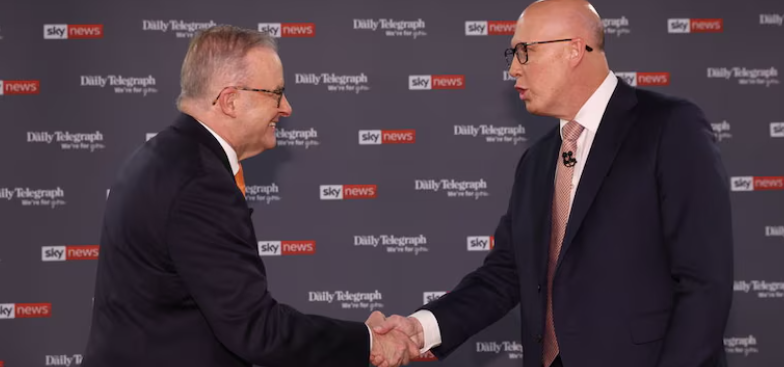Melbourne, 9 April- Prime Minister Anthony Albanese was declared the winner of the first official leaders’ debate of the 2025 federal election campaign, after going head-to-head with Opposition Leader Peter Dutton in a televised forum hosted by Sky News and The Daily Telegraph in western Sydney.
In front of an audience of 100 undecided voters, both leaders tackled key issues including the cost of living, migration, healthcare, and climate policy. Cost-of-living pressures emerged as the dominant theme of the night, with both leaders presenting contrasting plans to tackle household expenses.
Fuel Excise and Economic Management
Dutton pledged to introduce a 50 per cent cut to the fuel excise for 12 months and said a Coalition government would review the policy’s extension after that period. Albanese dismissed the move as a short-term fix, warning that the Coalition’s spending plans—particularly its proposed $600 billion nuclear policy—would inevitably lead to budget cuts elsewhere.
Albanese leaned on his government’s record, highlighting back-to-back budget surpluses and ongoing cost-of-living support, insisting Labor’s strategy is both responsible and sustainable. “We’ve helped when needed, while keeping inflation in check,” he said.
Healthcare and Medicare
When a voter raised the increasing cost of seeing a GP, Albanese produced his Medicare card, saying, “This is the only card Australians should need.” Dutton, in contrast, asked the voter (audience member) if she also had to use a credit card—she confirmed she did—using the moment to criticise rising healthcare costs under Labor.
Migration and Foreign Investment
Dutton, questioned on how he would avoid “demonising migrants” in policy debates, stressed that migration makes Australia “a greater country,” but emphasised the need for a “well-managed” immigration program. On foreign property ownership, he reiterated the Coalition’s plan to ban foreign buyers—a measure Albanese argued is already in effect.
Climate and Solar Policies
Addressing climate policy, Albanese detailed Labor’s plan to subsidise household batteries for rooftop solar systems. Dutton responded by stating the Coalition supports solar energy but criticised the Labor policy as benefiting higher-income households.
Tax and Public Sector Flexibility
In response to questions about Labor’s tax policy, Albanese reaffirmed his government’s promise to cut the bottom marginal tax rate by one cent if re-elected. Meanwhile, Dutton defended the Coalition’s stance on public service flexibility, saying a Labor “scare campaign” forced them to drop plans to end remote work for public servants.
Audience Verdict
At the end of the night, 44 voters declared Albanese the winner, 35 sided with Dutton, and 21 remained undecided. Both leaders remained civil throughout the debate, with only minor interruptions. Many of their arguments echoed previous campaign messaging.
Dutton framed the election as a choice between a strong Coalition government and a potential Labor-Greens minority alliance. “We can manage the economy better and help families navigate Labor’s cost-of-living crisis,” he said. He also highlighted home ownership, health services, and national security as key Coalition priorities.
Albanese, meanwhile, projected confidence in securing a majority and urged voters not to trust the Coalition’s promises, referencing past budget cuts and inconsistencies. “In these uncertain global times, now is not the moment to return to the policies of the past,” he said.
The second and final leaders’ debate is scheduled to take place on April 16, broadcast by the ABC.





